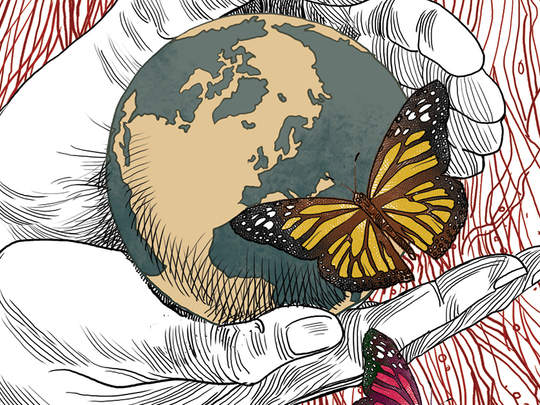
In a paper published recently in the journal Current Biology, titled ‘The Importance and Benefits of Species’, my colleagues and I at the Mohamed bin Zayed Species Conservation Fund advocated that all plant and animal species are important, no matter their usefulness, apparent value, intelligence or attractiveness. And because all are important. All should be conserved.
This means that even the obscure new species of cuckoo wasp — Hedychridium Anithaae — recently found in Al Wathba Wetland Reserve, 40km from the centre of Abu Dhabi, is worthy of our collective conservation attention. And so too are many other often-overlooked and taken-for-granted species found throughout the UAE.
We often look at species and ask “what has it done for me lately?” or “what good is it?” We tend to assume that if it provides no obvious value, then it must not be worth much and therefore is not worth the effort to conserve for future generations. Not only is this a selfish view, but it is also a short-sighted one. Every species has a role in nature and a value, even if we have not discovered it yet.
There are many examples of species that make previously unknown contributions to nature and mankind. Scientists recently discovered that fiddler crabs, common in salt marshes and mangrove forests throughout the world, help mangrove trees grow taller, larger and thicker, which in turn helps sequester more carbon. A recent study of Blue Mussels, a common type of shell fish, revealed properties that may advance antifouling and adhesion technology, which may result in massive fuel savings to marine vessels, as well as advances in adhesives with medical applications.
In the paper, we have made the case that the default setting for our relationship with all species on earth should be set to “conservation”. We need to stop trying to develop arguments for why a species should be saved and instead work from an assumption that all species should be saved.
The value offered by a single species is often unexpected and unanticipated, such as the potential value of a newly-described species of Panaque catfish in the Amazon River basin whose unique gut bacteria can digest wood and may prove beneficial in manufacturing paper using less energy.
When a species is lost or greatly reduced in an environment, there are consequences. For example, the Indian vulture was unintentionally poisoned in the 1990s, reducing their numbers by more than 99 per cent. This resulted in an increase in feral dogs, which led to greater occurrences of rabies across India and Pakistan.
In recognition that all species are important, the Mohamed bin Zayed Species Conservation Fund was established in 2009 to provide financial support to species conservation projects worldwide. To date, the fund has donated more than $12 million (Dh44.13 million) across 150 countries in support of 900 different species of plant, reptile, bird, fish, invertebrate, mammal and fungus. Not only does the fund support charismatic species such as the rhinoceros, gorilla and zebra but also smaller, lesser-known ones such as butterfly, orchid and tortoise.
In Abu Dhabi, our leadership has officially designated more than 13 per cent of our total land and sea area as protected. These protected areas provide safe environments for wildlife and have enabled the successful breeding and reintroduction of certain species. We take pride that the Greater Flamingo is now flourishing in Al Wathba Wetland Reserve and the Arabian Oryx, once extinct in the wild, has been successfully reintroduced into the Um Al Zumoul Protected Area.
We must also be aware that these protected areas provide shelter for populations of all sorts of other species and these species are worth our conservation efforts, as well. The cuckoo wasp in Al Wathba Wetland Reserve, the crabs living in Mangrove National Park off the coast of the city of Abu Dhabi, the Dwarf Palm Tree on Jebel Hafeet in Al Ain, are part of the complex web of nature — and their roles in nature may not be immediately understood.
Just because we generally do not know what most species’ roles are in nature, does not mean that they are unimportant. We need to approach with caution every situation in which a species value is called into question and adopt the precautionary principle to protect all species from extinction.
Razan Al Mubarak is managing director of The Mohamed bin Zayed Species Conservation Fund.









